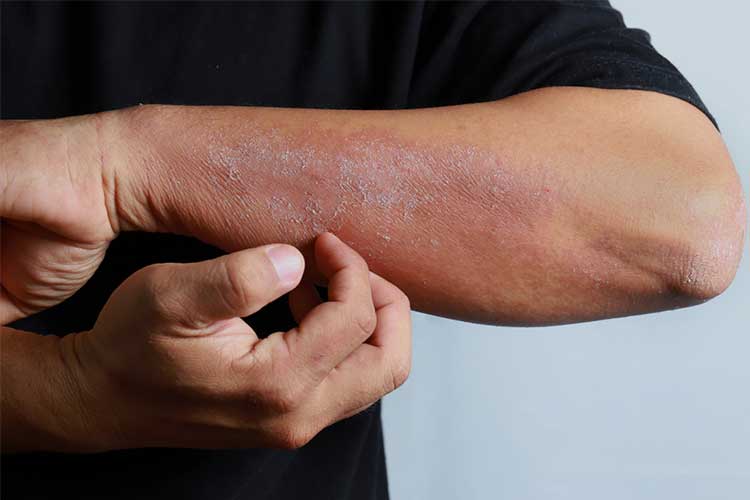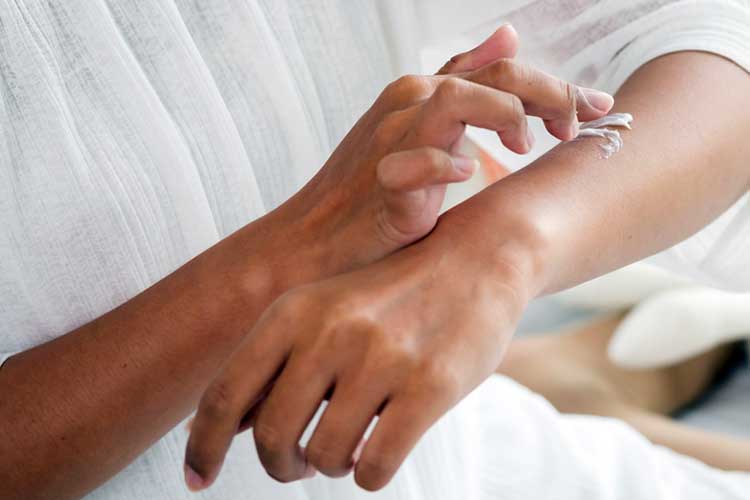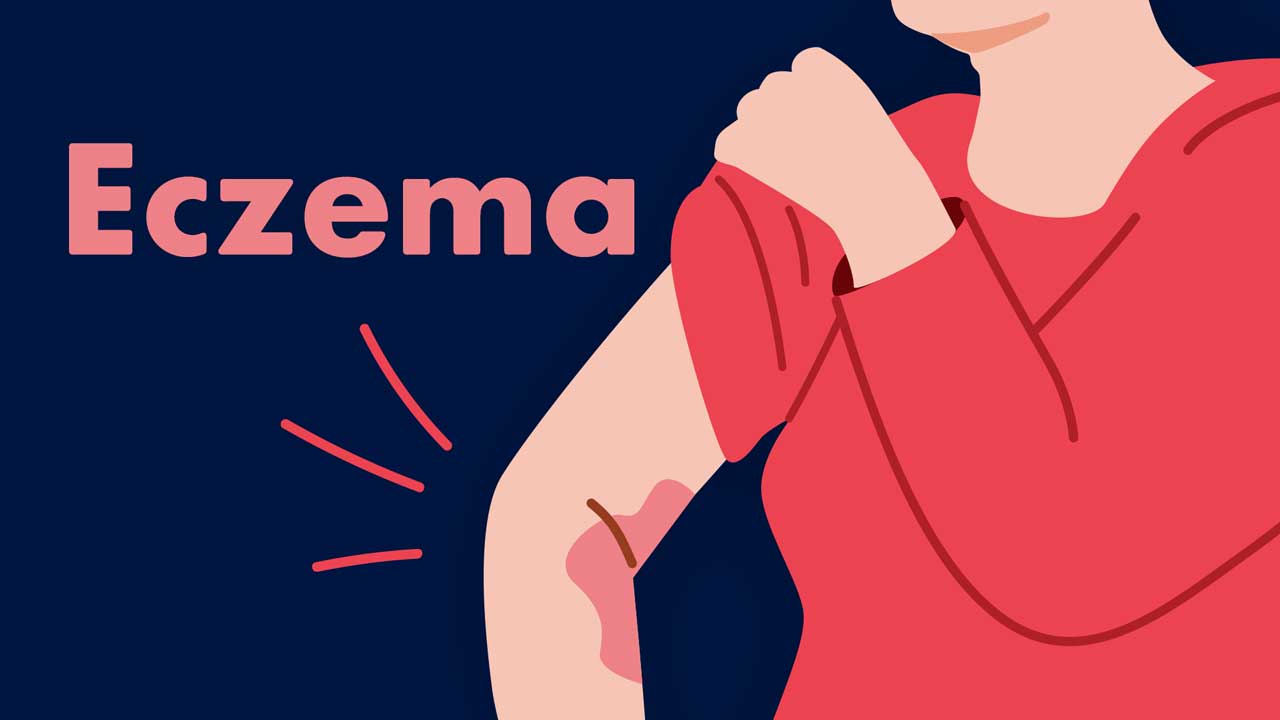Atopic dermatitis, more commonly known as eczema, is a chronic inflammatory skin condition that often presents as dry, itchy, and reddened skin (Better Health Channel 2023).
The exact cause of eczema is largely unknown. However, it appears that those with a family history of allergy are more likely to develop eczema (ASCIA 2024).
Understanding Eczema
Eczema causes a person’s skin to have difficulty retaining moisture. Therefore, the skin is prone to dryness and is more open to allergens and irritants. If the person then scratches their skin, it can become even itchier. This is called the ‘itch-scratch cycle’. It can cause discomfort, disrupt sleep and impact quality of life (ASCIA 2024).
People with eczema often find that there are periods during which it’s more manageable and times when it’s less - the less manageable periods are known as flare-ups (NHS 2024).
Flare-ups can be triggered by environmental irritants, certain fabrics, heat, and, in some cases, particular foods (Better Health Channel 2023).
Managing eczema usually involves general skincare strategies as well as prescription treatments. While eczema is manageable, the effects of this condition on people should not be underestimated. Eczema can have a profound impact on everyday life, particularly on physical and mental health. It’s worth noting that eczema is not contagious (Better Health Channel 2023).
Why Does Eczema Occur?
The exact cause of eczema is not known, but it’s thought to be a combination of environmental triggers and genetic factors. People who have eczema have an overactive immune system that produces inflammation when triggered by a substance inside or outside of the body (NEA 2024).
A person is more likely to develop eczema if they have a family history of eczema or allergic conditions, such as allergic rhinitis (hay fever) or asthma (Better Health Channel 2023).
It’s speculated that diet does not usually affect or aggravate eczema. If patients think a certain food is to blame, they should consult a doctor or dietitian for proper allergy testing and dietary advice (Better Health Channel 2023).

Facts About Eczema
- A vast number of people who have eczema have co-occurring allergies. These often include hay fever, asthma, food allergies or dust mite allergies.
- According to studies, up to 30% of infants with eczema who have a family history of allergies will develop a food allergy, and up to 40% will develop hay fever and/or asthma.
(ASCIA 2024)
Eczema Throughout Life
Types of eczema are generally divided by stage of life (note, however, that eczema can affect people of any age). There are three main stages:
- Infantile eczema: Affects about 20% of children under the age of two, usually within the first six months of life. It usually improves between the ages of two and five.
- Childhood eczema: Occurs between the ages of two and four or can follow infantile eczema. It commonly causes rashes in the elbow creases, behind the knees, across the ankles, and sometimes on the face, ears and neck.
- Adult eczema: Similar to childhood eczema. It often improves in midlife and is uncommon in older adults.
(ASCIA 2024)
Symptoms of Eczema
- Dry skin
- Itchiness
- Red, scaly, and inflamed skin
- Weeping on the affected area
- Lesions
- Changes in skin colour, such as lighter (hypopigmentation) or darker (hyperpigmentation) areas.
(Better Health Channel 2023; Healthy WA 2014)
Managing Eczema
Good Hygiene
People with eczema are particularly vulnerable to infection from pathogens such as Staphylococcus aureus and herpes simplex, leading to skin conditions such as impetigo, cold sores, and warts (ASCIA 2024; Better Health Channel 2023).
Suggestions for washing include:
- Take lukewarm showers or baths, avoiding very hot water
- Use soap-free washing products designed for people with eczema or sensitive skin
- Bath oils may help to moisturise the skin while bathing
- Pat dry skin after bathing, rather than rubbing or wiping dry.
(ASCIA 2024; Better Health Channel 2023)

Reduce Irritants
- Avoid overheating the skin. Wear layers of clothes that can be removed as opposed to one very heavy layer
- Avoid overly heated rooms
- Avoid perfumed products, make-up, and fragranced skin lotions
- Opt for soft, smooth materials next to the skin. For example, wear 100% cotton rather than scratchy materials like wool, polyester, or acrylic. A cotton/synthetic mix may be appropriate
- Avoid frequent exposure to water, soap, grease or chemicals, as these may damage the skin’s protective barrier
- Wear protective gloves when handling any chemical or detergent. Avoid swimming in chlorinated pools or moisturise well afterwards.
(ASCIA 2024; Better Health Channel 2023)
Avoid Drastic Changes in Temperature
- During winter, try not to overheat the house. Dress warmly when outdoors and remove layers when in a heated environment
- During summer, don’t over-cool the house. Air conditioners can dry out the air and irritate the skin
- Avoid intense physical activity in very hot weather. For example, exercise either first thing in the morning or in the evening when the sun is lower.
(Better Health Channel 2023)

General Tips for Eczema Management
- Control the urge to itch
- Keep fingernails short, so if a person does scratch, it will cause less aggravation
- Use cold compresses and wet wraps to control the itch. Non-drowsy antihistamines may also reduce symptoms
- Moisturise very regularly
- Emollients (moisturising treatments) should be used frequently. Creams, ointments, and topical corticosteroids prescribed by a healthcare professional to reduce symptoms during flare-ups may also help
- Responding to infection:
- Antibiotics may be recommended if recurrent infection occurs
- Some people with eczema need to treat infections as they occur, while others may require long-term prevention strategies.
(Better Health Channel 2023; ASCIA 2024; Healthdirect 2024)
Conclusion
While eczema has no cure, it is mostly manageable. Many people find that it improves naturally with age (Healthy WA 2014). It’s important to know and respond to eczema triggers - a general practitioner or specialist can help patients devise a plan catered to their eczema.
Test Your Knowledge
Question 1 of 3
True or false: It is important to keep skin affected by eczema clean; any type of soap is fine to use.
Topics
Further your knowledge
 Free
Free Free
Free
 Free
FreeReferences
- Australasian Society of Clinical Immunology and Allergy 2024, Eczema (Atopic Dermatitis) Frequently Asked Questions (FAQ), ASCIA, viewed 30 October 2024, https://www.allergy.org.au/patients/skin-allergy/eczema
- Better Health Channel 2023, Eczema (Atopic Dermatitis), Victoria State Government, viewed 30 October 2024, https://www.betterhealth.vic.gov.au/health/conditionsandtreatments/eczema-atopic-dermatitis
- Healthdirect 2024, Eczema, Australian Government, viewed 30 October 2024, https://www.healthdirect.gov.au/eczema
- Healthy WA 2014, Eczema (Atopic Dermatitis), Government of Western Australia, viewed 30 October 2024, https://www.healthywa.wa.gov.au/Articles/A_E/Eczema-atopic-dermatitis
- National Eczema Association 2024, Eczema Causes and Triggers, NEA, viewed 30 October 2024, https://nationaleczema.org/eczema/causes-and-triggers-of-eczema/
- National Health Service 2024, Atopic Eczema, NHS, viewed 30 October 2024, https://www.nhs.uk/conditions/atopic-eczema/
 New
New 
